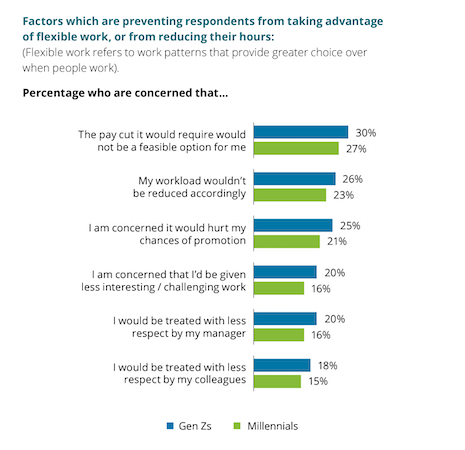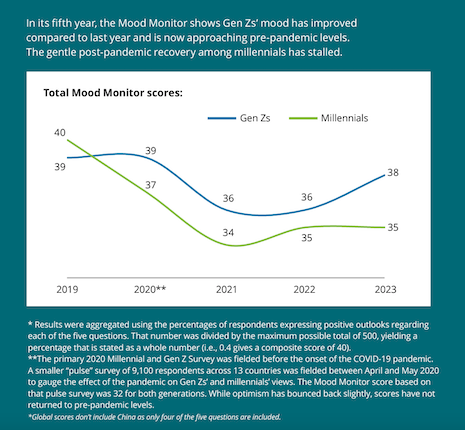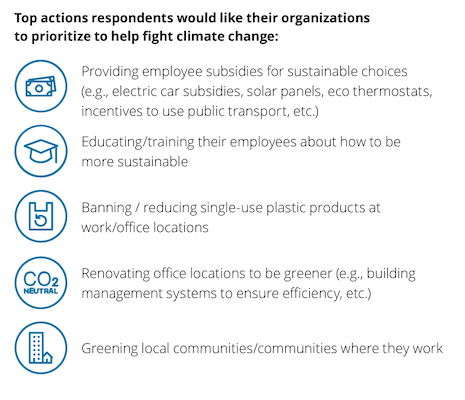 Deloitte's latest report uncovers that factors such as environmental concerns remain high on a list of work performance inhibitors. Image credit: Deloitte
Deloitte's latest report uncovers that factors such as environmental concerns remain high on a list of work performance inhibitors. Image credit: Deloitte
New data from global consulting firm Deloitte shows that workplace attitudes among the office’s youngest cohort are on the up and up.
In 2019, just one in five Gen Z and millennial employees reported a high affinity for their work/life balance – today, that figure amounts to one-third of the demographic. Despite year-on-year improvements in sentiment, findings from the 12th-edition survey involving more than 22,000 Gen Z and millennial respondents across 44 countries reveal that cost of living, economic uncertainty and environmental concerns remain high on a list of performance inhibitors.
"Gen Zs and millennials are striving for better work/life balance,” said Michele Parmelee, global deputy CEO and chief people and purpose officer at Deloitte, in a statement.
"They are also values-driven, concerned about the environment, the state of the world, and the future they see developing ahead of them,” Ms. Parmelee said. “They're looking for employers who can help empower them to make a difference.
"Organizations that actively listen and help address their needs and concerns will improve business resiliency and implement actionable change in our world."
Deloitte's Global 2023 Gen Z and Millennial Survey reflects the responses of 14,483 Generation Zs and 8,373 millennials from 44 countries across North America, Latin America, Western Europe, Eastern Europe, the Middle East, Africa and Asia Pacific, via a survey conducted using an online, self-complete-style interview, with fieldwork completed between Nov. 29, 2022, and Dec. 25, 2022. Supplemented with qualitative interviews conducted in March 2023 with 60 Gen Zs and millennials from Brazil, Germany, India, Japan, the U.K. and the U.S. -- Deloitte's study defines Gen Z respondents as those born between January 1995 and December 2004, and millennial respondents as those born between January 1983 and December 1994.
Recruiting and retaining a new generation
As luxury employers continue to search for formulas that attract and retain the best entry- to mid-level talent, the Global 2023 Gen Z and Millennial Survey details the degree to which individuals from the intern level and above are adjusting their respective relationships with their companies of choice.
In terms of the search, more than half of Deloitte’s respondents report taking steps to research a brand's environmental impact and policies before accepting a job, while one in six state that they have already changed jobs or sectors due to climate concerns. One in four plan to do so in the future.
 As remote standards turn into hybrid schedules, prospective and current Gen Zers and millennials are weighing the costs and benefits of workplace policies. Image credit: Deloitte
As remote standards turn into hybrid schedules, prospective and current Gen Zers and millennials are weighing the costs and benefits of workplace policies. Image credit: Deloitte
More than one in every three Gen Z and millennial employees has turned down employers that do not align with their values, as ESG and DEI initiatives continue to play a crucial role in recruiting.
Following COVID-19-induced workplace policy shifts and the implementation of accessible conditions, prospective and current Gen Z and millennial employees rank flexible work arrangements first upon a growing list of priorities.
As remote standards turn into hybrid schedules, the group is expressing a deep appreciation for both models.
 While findings are from the 12th edition of the survey, Deloitte's "Mood Monitor" reaches its third year. Image credit: Deloitte
While findings are from the 12th edition of the survey, Deloitte's "Mood Monitor" reaches its third year. Image credit: Deloitte
While where work gets done changes, requests have progressed in terms of when tasks are completed, and how jobs are structured in general, advocating for condensed four-day work weeks for full-time employees, and for more part-time jobs overall, citing career advancement trajectories as an additional area of focus.
Besides fiscal standing, the study shows that security amid a simultaneous climate and cost-of-living crises is on the minds of many Gen Z and millennial team players.
Trying times
With expectations for corporate entities to take a stance on important socio-economic issues growing overall – nearly four in 10 respondents told Deloitte reported having rejected work assignments due to ethical concerns while, on the bright side, experts share that the group’s satisfaction with flexibility at work, along with diversity, equity, and inclusion efforts have increased from previous years’ standings (see story) – one area of focus remains particularly volatile.
As roughly six in 10 Gen Zs and two-thirds of millennials think the economy will worsen or stay the same in their country over the next year, workers worry that external challenges such as impacts felt from the war in Ukraine could threaten this momentum.
Concerns are unfortunately permeating into employees' personal lives. Deloitte’s report reflects the fact that more than half of Gen Zs and millennials say they live paycheck to paycheck, at 51 percent and 52 percent, respectively.
"Not only do they want to see action, they want to be empowered to be involved."
Deloitte Global Deputy CEO Michele Parmelee discusses her company's 2023 Gen Z and Millennial survey. pic.twitter.com/ggwsRhDyup
— Quest Means Business (@questCNN) May 18, 2023
While the figure is up five percentage points from 2022, heightened fears around unemployment have millennials and Gen Z members holding on to their pockets and spreading themselves thin by taking on part-time work to supplement payouts from primary jobs, moves that could affect productivity, hitting at performance for companies that are unable to resource employees effectively.
Almost one of every two Gen Z respondents, and nearly one of every four millennials, have already done so.
Of course, climate pressure ultimately underlies all progress.
 One in six millennial and Gen Z employees report having already changed jobs or sectors due to climate concerns. Image credit: Deloitte
One in six millennial and Gen Z employees report having already changed jobs or sectors due to climate concerns. Image credit: Deloitte
It seems that workplaces are responding – 56 percent of Gen Zers and 50 percent of millennials have received on-the-job training in skills needed to transition to a low-carbon economy (see story).